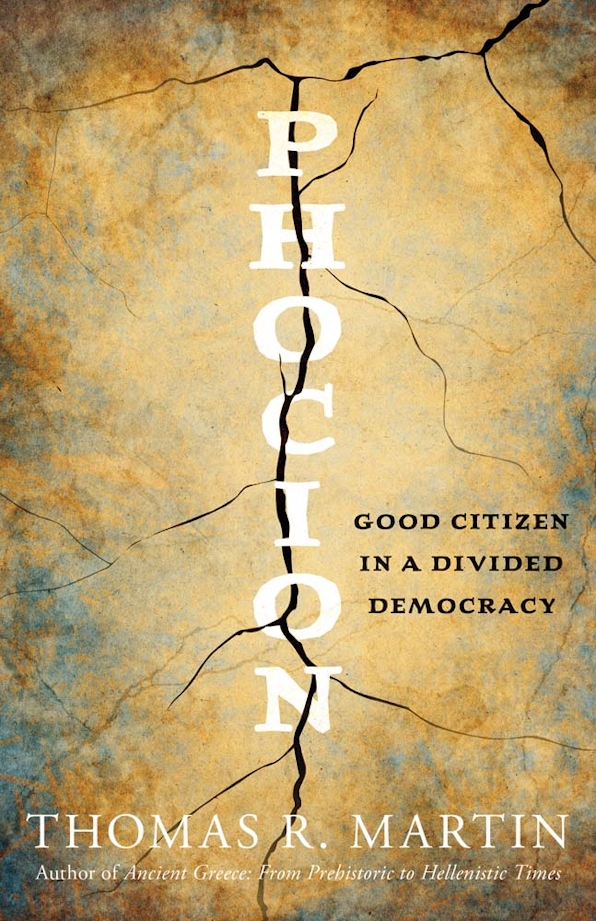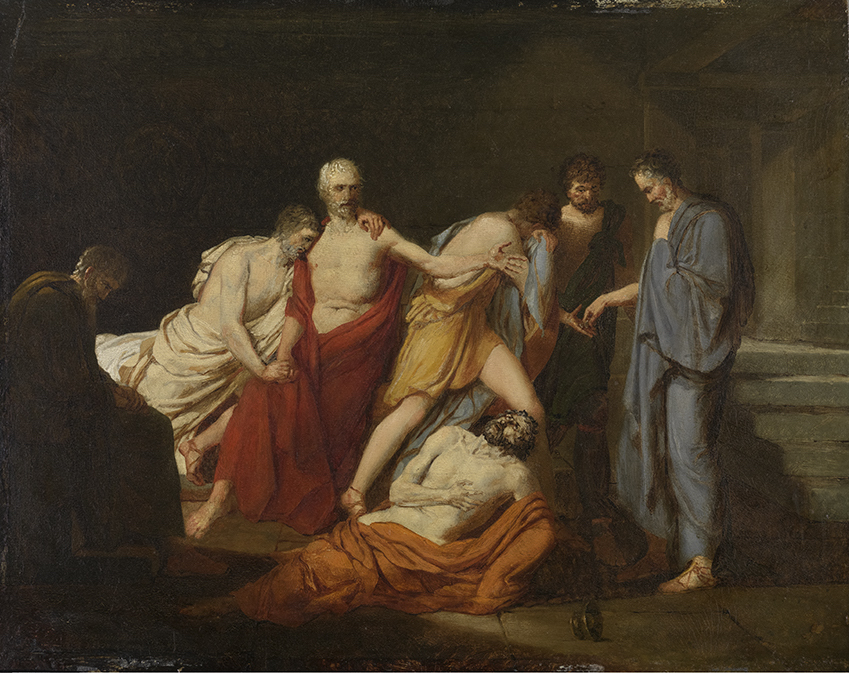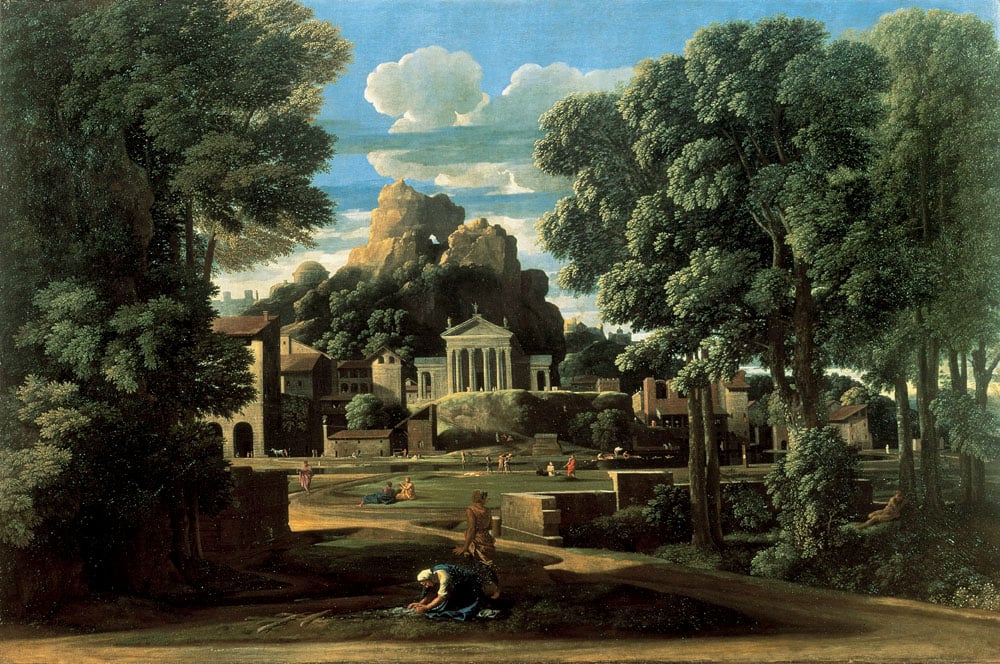Phocion: Good Citizen in a Divided Democracy by Thomas R. Martin

Yale University Press, 2024
Phocion (402–318 BCE) won Athens’s highest public office by direct democratic election an unmatched forty-five times and was officially honored as a “Useful Citizen.” A student at Plato’s Academy, Phocion gained influence and power during a time when Athens faced multiple crises stemming from Macedonia’s emergence as an international power under Philip II and his son Alexander the Great. Following Athens’s defeat by Macedonia, Phocion unsuccessfully sought mild terms of surrender. Oligarchy was imposed on democratic Athens, and more than twelve thousand “undesirable” Athenians were exiled. When the oligarchic regime was overthrown and the exiles returned, dispossessed Athenians took out their volcanic anger on Phocion, who throughout his career had often been a harsh critic of the citizens’ political decisions. His inflammatory rhetoric contributed to the popular conclusion that he lacked a genuine sense of belonging to the community he wished so desperately to preserve. When he was eighty-four, the Athenians convicted him of treason and condemned him to die by hemlock. (from the book flap)
Thomas R. Martin has written an engaging biography on Phocion, the Athenian leader that had the task of leading the city during its tumultuous years of declining influence and power in the 4th century BC. How one of Athens most acclaimed generals (elected 45 times in 60 years) became the scapegoat for the city’s loss of independence makes for an remarkable and bumpy ride.
Since records of Phocion’s accomplishments and life don’t appear until his mid-20s, Martin tracks what Phocion’s early life would have been like. The assumption is that his family was well-to-do based on Plutarch’s assertion and the fact that he attended Plato’s academy (which required substantial funds). The focus of those early years covers what his development, adolescence, and early military life would have been like for affluent Athenians in this era. The emphasis on a male youth’s development in that period would be in demonstrating his ability to be a worthy member of Athenian society. In essence, does he measure up to what the city values?
Phocion won honor around the age of 26 as the commander of a trireme when the Athenians defeated Sparta in the naval Battle of Naxos (376 BC). Phocion’s bravery and tactics saved the day for Athens in their first naval victory since much earlier (back in the Peloponnesian War). He gained further honors when entrusted with conducting a mission to collect funds from the Second Athenian League members—instead of commanding the recommended fleet of triremes, Phocion took only his ship. By not intimidating allies, he was able to collect the needed funds. This was an early example of his ability to deal effectively with other powers, which sometimes seems better than his dealings with Athenians.
As Martin highlights, Phocion was deliberately confrontational with Athenian leaders and citizens. He didn’t hesitate to harshly criticize political decisions. Plutarch “includes more than sixty quotations of strongly worded comments that Phocion made in public life. Not a single one is positive in its evaluation of his fellow citizens.” While such statements weren’t uncommon in the Athenian public arena, Plutarch highlights this curmudgeonly aspect of Phocion’s character. While always having Athens’ best interest at heart, he appears to have kept himself aloof from social gatherings, adding to his ‘apartness,’ and highlighting one of his faults: “Key to any understanding of Phocion is the recognition that in his time Athenians were expected to conduct themselves in accordance with an unshakeable sense of belonging to their society, a society that was extremely proud of its ancestral history.”
Martin stresses that while Phocion understood the necessary Athenian sense of belonging to the community in the abstract (and in his actions for the general safety of the city) he didn’t seem able to demonstrate it sufficiently in his direct interactions with the populous and their other leaders. A few of the things mentioned that helped set Phocion apart from Athenians included dressing plainly, walking barefoot (I can relate), sending his son to Sparta for education/training, and declining to contribute to a special collection the Assembly levied for a large-scale sacrifice to the gods by claiming illiquidity. Many of these seem petty, but adding them up with along with his comments that weren’t sugar-coated and it’s easy to see where the public might not feel Phocion was one of them.

Picture source
Martin lists four harsh realities (quoted below) that citizens pursuing a high-office career in Athens had to face:
- Athenians were merciless in punishing their officials for falling short of expectations,
- The personal expenses that commanders were expected to undertake to fulfill their military duties could ruin their families,
- Service with the monarch of a superpower offered a way to relieve monetary pressures for those willing to travel far from home and operate in unfamiliar and dangerous environments, and
- Good relations with foreign leaders who wielded influence in Athens could be invaluable in protecting someone from the consequences of decisions made by his fellow citizens in anger.
A related harsh reality could be that good relations with foreign leaders could appear as disloyalty to Athens. During much of Phocion’s adult life there was a constant jockeying for leadership power within the Greek city-states as well as foreign incursions that had to be addressed. Because of Athens’ relative declining influence during much of that time, Phocion’s recommendations for the city involved uncomfortable compromises with outside powers in order not just to provide its safety but its continued existence. For a populous weaned on the glory of Athens the fall from power, the necessary concessions, and the lack of local control would be a bitter pill to have to swallow and any backlash was destined not to be adequately thought out or applied. During several of these crises Phocion was in direct conflict with the famed orator Demosthenes on what actions Athens should take, a view into conflicting principles of the two influencers of the day.
Another factor making a life in government difficult in Athens during this stretch of history was the shifting political structures that Athens went through. At several points in this period a majority of voters was disenfranchised and an oligarchy imposed on the city, one time led by Phocion at the behest of the Macedonians. Alexander the Great’s early death and the struggle for power in the different regions of his empire did not help the task at hand for Phocion. It was a difficult situation that would have required understanding of the deep political divisions within Athens as well as dealing with foreign leaders who seemed to be much less trustworthy than those he dealt with earlier in his career.
Phocion often showed himself to have the interests of Athenians at heart, such as turning down foreign bribes (disguised as gifts), but his brusque demeanor wasn’t going to win him support when things turned sour. Alexander the Great’s lieutenants initially divided up parts of the empire for their rule at his death. But at Antipater’s death (the lieutenant holding Macedonia and Greece) a struggle ensued between ruthless leaders for control of the area, one of whom promised restoration of direct democracy so that exiles could return to Athens. Phocion, as nominal representative for the Athenians, was caught between the Macedonian rivals to the throne as well as duplicitous Athenians ungrateful for all he had done for the city. A sham trial was held and Phocion and several of his friends were sentenced to death. After their execution administered by hemlock (note Joseph Denis Odevaere’s painting’s likeness to David’s The Death of Socrates), further disgrace was added when the executed men’s bodies were unceremoniously dumped outside Athens’ territory. Phocion’s widow managed to have her husband’s body cremated and his bones and ashes returned and buried at home.
Martin laid out an excellent account showing how Phocion’s thought process probably worked regarding his idea of Athens when believing he belonged to the city and not to the people. Some of this may be attributable to a Socratic ideal, something abstract instead of the tangible reality, that he would have learned from Plato.
The last part of the book explores how the memory of Phocion has evolved since his death. Years later, a statue to him was erected in Athens and he received a formal re-burial. His inclusion in Plutarch’s Lives insured he would be remembered by future generations. Writers, such as Alexander Hamilton, used “Phocion” as a pseudonym to introduce the political stance they were adopting.
This volume is in Yale University Press’ Ancient Lives series and I love the presentation, including an essay on the source notes as well helpful chronology, map, notes, and bibliography. All the things I love in a book when it’s well done. For those who want to dig deeper, there are plenty of recommendations in the book to do so. I’m at the point thinking about Martin’s questions at the end of the book addressing what lessons can be taken away from Phocion today in a divided democracy, especially regarding what it means to be a “useful and good citizen” as well as a political leader in such a state. What happens to that citizen or leader when the populous is deeply divided, and how should that gap be navigated? I’m not sure Phocion provides a definitive answer, but his example is worth studying.

Picture source
Notes and Links
- In my post on Ian Worthington’s Demosthenes of Athens and the Fall of Classical Greece, I echo Worthington’s assessment that, “To say his [Demosthenes’] recommendations caused Athens to lose its freedom is an overstatement.” The more I read about Phocion, though, I don’t think it a stretch to say that Demosthenes’ conduct exacerbated how much of its freedom Athens lost by following his lead. Granted, these were tumultuous times and anything could have happened with slight changes in events. Nevertheless, it’s an interesting study to look at a comparison between these two highly principled men. Phocion factored in the reality of Athens’ weakened state at the time while Demosthenes appears to have stood almost solely on principle. Demosthenes would point out that he tried to improve Athens’ capabilities and standing in the run-up to the confrontation with Philip but had been consistently rebuffed, which was somewhat true. In those cases it would put him in alignment with Phocion’s consideration for Athens’ safety, although usually in preparing for confrontation instead of avoiding it where possible.
- Yale University Press’ page for the book, which has samples you can read (as of posting date)
- Martin’s blog post at YUP’s site: Divided Democracy—The Past is (Frighteningly) Never Dead and also published in Holy Cross Magazine
- Plutarch’s Lives, “Phocion” From the Loeb Classical Library, Lives, Volume VIII, Translated by Bernadotte Perrin, 1919
- Cornelius Nepos’ Life of Phocion, Translated by J.C. Rolfe (1929)
- My notes on Plutarch’s “Phocion”